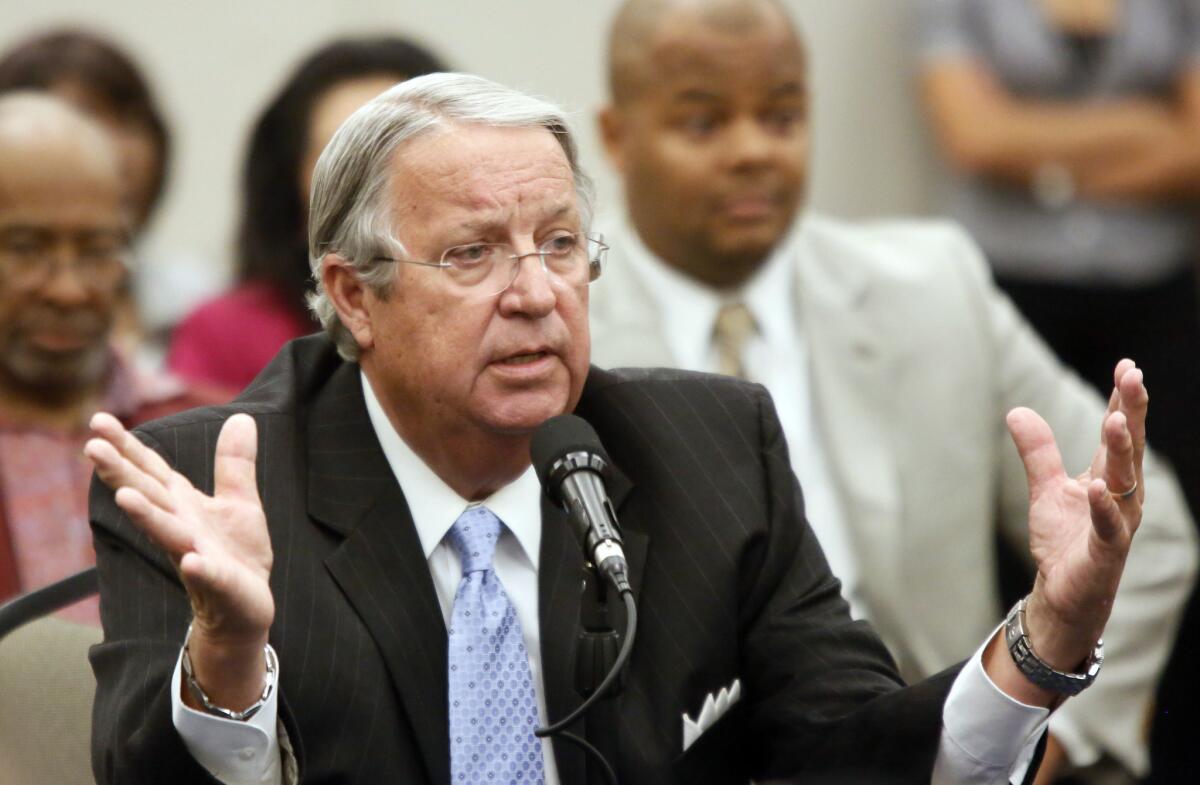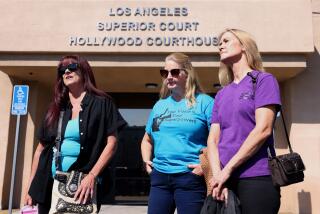County weighs public âjohn-shamingâ campaign to deter child sex trafficking

L.A. County Supervisor Don Knabe has proposed a plan to publicize the names of johns who solicit prostitutes.
For years, Los Angeles County officials have been grappling with ways to crack down on the trafficking of children for sex on the streets, in hotels and on Internet sites throughout the county. Theyâre now considering another tactic.
County supervisors could vote in the coming weeks on a plan to publicly post the names and police mug shots of people caught soliciting prostitutes, in hopes that the prospect of public shaming will deter johns from seeking sex from minors.
The move is part of a larger effort to redefine minors involved in the sex trade as rape victims and victims of sex trafficking rather than delinquents. That includes new county protocols that bar sheriffâs deputies from arresting juveniles on prostitution charges and instead require them to connect the children to services.
Itâs also part of a wider trend of cities and counties that have launched shaming campaigns to discourage prostitution. But most of those campaigns have not distinguished between johns who buy sex with adults from those who pay to have sex with children. Itâs not clear whether Los Angeles County will be able to do so.
Supervisor Don Knabe asked county attorneys to look into the feasibility of a âjohn-shamingâ campaign last December. On Tuesday, interim County Counsel Mary Wickham told the board she had developed a plan. Under the proposal, the district attorney would be asked to forward names and photographs of people convicted of soliciting prostitution or loitering with intent to solicit prostitution, which would then be posted on the county website.
Knabe said the proposal would help bring âaccountability on the demand sideâ by publicly shaming johns.
âI really feel strongly that by posting the names and the pictures of those convicted of the solicitation, thatâs going to have a dramatic effect on the population out there,â he said.
Supervisor Mark Ridley-Thomas asked the attorneys to look into how to make a distinction between people convicted of soliciting adults for sex versus minors. He asked they look into including wording to make clear that purchasing sex with a minor is statutory rape.
But itâs not yet clear what the mechanism might be to distinguish between johns who solicit children versus adults.
Jane Robison, a spokeswoman for Los Angeles County Dist. Atty. Jackie Lacey, said the current law on soliciting prostitution makes no distinction whether the adult is soliciting sex from another adult or a minor, although a pending bill in the Legislature would change that. Wickham did not respond to an email seeking comment.
The practice of publicly shaming johns predates the Internet. In 1979, New York City debuted âJohn Hourâ on public television and radio, announcing the names and addresses of men convicted of purchasing sex. And police in Wilkes-Barre, Pa., in the 1980s used to arrest johns in prostitution stings and then send their names out in press releases so they would run in the local Sunday paper.
More recently, a growing number of jurisdictions have taken the campaigns online. San Bernardino and Orange counties post names and photographs of people convicted of solicitation-related crimes. The city of Fresno posts information about johns after their arrests rather than waiting until conviction, but takes the information down after 15 days.
Michael Shively, a researcher who studied municipal approaches to combatting sex trafficking for the National Institute of Justice in Washington, D.C., and now runs a website outlining initiatives around the United States, said there has been no formal social science research on the effectiveness of âjohn shamingâ campaigns.
But, he said, âThere are many reasons to think it probably is effective.â
Surveys conducted among men sent to âjohn schoolsââeducation or treatment programs for those caught soliciting commercial sexâfor instance, have found that they were often more concerned about spouses, significant others or bosses finding out about their behavior than they were about fines or jail time.
Susan Kang Schroeder, chief of staff to Orange County Dist. Atty. Tony Rackauckas, said it would be hard to measure the deterrent effect of their year-old program because the number of solicitation arrests largely depends on the resources police departments put into sting operations.
But, she said, âWe know that defendants donât like it, because they try to bargain it away instead of going to trial, which we donât do.â
Kang Schroeder said it would be difficult to specifically call out people who attempt to purchase sex from children, because in most cases, johns are arrested for soliciting adult undercover officers posing as prostitutes. An adult caught actually having sex with a child would face more severe charges, she said.
Twitter: @sewella
ALSO
Search for new L.A. schools chief shifts focus to individual candidates
Airbnb wins the vote in San Francisco, but cityâs housing debate rages on
Family of Chinese mom who died after birth complications gets $5.2 million
More to Read
Sign up for Essential California
The most important California stories and recommendations in your inbox every morning.
You may occasionally receive promotional content from the Los Angeles Times.











